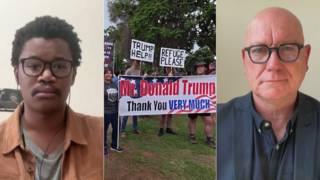
Anti-apartheid activist Ahmed Kathrada has died at the age of 87. Kathrada, better known as Kathy, was a member of the African National Congress. In 1963, he was arrested with other ANC leaders and went on to spend 26 years in prison—18 of them on Robben Island along with Nelson Mandela. He later served as President Mandela’s parliamentary adviser. In 2014, Ahmed Kathrada spoke in Visby, Sweden. He began by talking about Nelson Mandela’s famous statement during his trial in 1961.
Transcript
AMY GOODMAN: Anti-apartheid activist Ahmed Kathrada has died at the age of 87. Kathrada, better known as Kathy, was a member of the African National Congress. In 1963, he was arrested with other ANC leaders and went on to spend 26 years in prison—18 of them on Robben Island along with Mandela. He later served as President Mandela’s parliamentary adviser. In 2014, Ahmed Kathrada spoke in Visby, Sweden. Democracy Now! was there. He began by talking about Nelson Mandela’s famous statement during his trial in 1961.
AHMED KATHRADA: I remember his words during our trial—sorry. He ended with the words, “I have struggled all my life for a nonracial, nonsexist South Africa. It is an ideal which I hope to achieve. But if need be, it’s an ideal for which I’m prepared to die.” That was his—in a part of his address to the court. And throughout the trial, the expectation was a death sentence. But in the face of the death sentence, this is how the trial was conducted under the leadership of Mr. Mandela—an ideal for which he was prepared to die.
Our whole struggle was for a nonracial, nonsexist, democratic South Africa. In pursuance of our goals, people of all communities paid the supreme sacrifice. It may not be known, but just to mention a couple of names, we had a person by the name of Ruth Slovo. She went into exile and assumed the position of a professor at the University of Maputo. She received a package from the United Nations. Unknown to her, the passage—the package, rather, went through the South African police. And the South African police planted something in that package. And when Ruth opened that package, it was a bomb. And as she opened it, the bomb exploded, and she died. Now, that was one of many who paid the supreme sacrifice in the struggle for our democracy—people of all communities. I can talk of Dulcie Hartwell—I mean, Dulcie September, rather, who was an ANC representative in Paris. She was assassinated in Paris. There’s Saloojee, there’s Timol, who were thrown off the buildings of police headquarters and killed.
Ours was historically a struggle for a nonracial, nonsexist, democratic South Africa. That is what sent many people to prison, and that is for—many, many of our colleagues lost their lives and were not alive to see the birth of democracy in our country. So we are 20 years old as a nonracial, nonsexist, democratic South Africa, but we have made quite important strides. Every university in our country is mixed now. Almost every university director is black. And one can go on and on to talk of the progress that has been made towards a nonracial society.
But coming here tonight, it’s a great honor to be here because, throughout our struggle, one of our greatest friends were the people of Sweden. They supported us throughout our struggle, whereas other Western countries, many of them, connived with apartheid, connived with the apartheid government. But Sweden, in particular, and other Scandinavian countries stood by us. When our president at that time, Oliver Tambo, got a stroke, it was in Sweden that he was hospitalized. It was in Sweden that he regained his health and was in a position to return to a free South Africa. So I want to once again take the opportunity to thank the people of Sweden for being such close friends of our struggle. We are seeing the fruits of that every day of our lives.
AMY GOODMAN: That was Ahmed Kathrada, speaking in 2014. He has died in Johannesburg at the age of 87.













Media Options